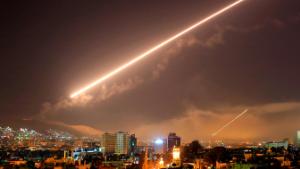After the Syria strikes, is there any chance for diplomacy?
(CNN)French President Emmanuel Macron wants the world to seize the moment. After Friday night's strikes against regime targets in Syria, he's demanding a concerted drive to resurrect the international peace process, last seen late in 2016. Whether anyone listens may decide if Syria turns the corner towards peace or descends into an even more dangerous cycle of destruction.
The strikes themselves were not about regime change or forcing Assad to negotiate, but about deterring the use of chemical weapons by the Assad regime, which remains free to kill Syrians with conventional methods.
As David Miliband, the CEO of the International Rescue Committee, puts it, the strikes "will become a historical footnote unless they are matched by a diplomatic offensive of sustained and serious character."
Speaking with Russian President Vladimir Putin on Friday, Macron said the priority must be to "initiate negotiations as soon as possible on a credible and inclusive political process," according to a statement from the Elysee Palace. It was a message he repeated after the strikes to US President Donald Trump and the Turkish leader Recep Tayyip Erdogan.
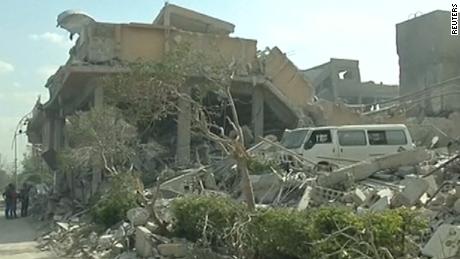
Play Video
US ally: We convinced Trump to stay in Syria
Maybe the barest bones of such preparation are beginning to emerge. The US, UK and France, supported by Germany, agree that Syria's chemical weapons must be destroyed once and for all; there must be an immediate ceasefire; and that the Syrian regime has to accept a "substantial agenda' at the UN Geneva talks that would lead to what the French UN ambassador, François Delattre, calls an 'inclusive political solution.'
Bare bones indeed, and there won't be immediate progress in the current atmosphere. There are also plenty of headwinds.
The US and Russia
For any sort of diplomacy to occur, the downward spiral of US-Russia relations needs to be arrested. In an interview with Fox News on Sunday, US ambassador to the UN Nikki Haley said there were "multiple issues we have with Russia right now;" and she said more sanctions were coming this week.
On a whole range of issues, from arms control to the mutual expulsions of diplomats after the poisoning of former Russian spy Sergei Skripal and his daughter in the UK and the issue of Russian meddling in the 2016 election campaign, relations are at their worst for decades. The tough sanctions imposed by Washington against members of Putin's inner circle this month have compounded the crisis.
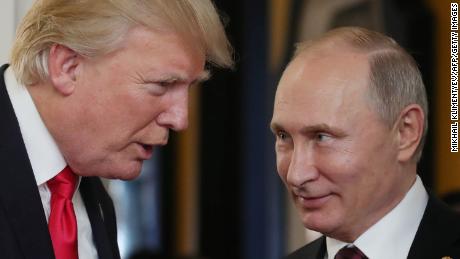
Play Video
Russia reacts to Trump's Syria strike tweets
But after three years of military engagement, Russia won't easily give up its victories in Syria, victories designed to show it is still a great power and an effective ally, as well as give it a foothold in the Mediterranean.
Looking for a US plan
US policy towards Syria is incoherent. Shortly before he was fired, Secretary of State Rex Tillerson set aside $200 million to stabilize northern Syria, where Kurdish-led militias who defeated ISIS are supported by some 2,000 US troops. There were plans to build a 30,000-strong border protection force. (Tillerson's speech, the only expression of the Trump Administration's policy towards Syria, has now been 'archived' on the State Department website.)
President Trump then froze the $200 million and said he wanted US forces out of northern Syria"very soon. Let the other people take care of it now," he told a rally in March.
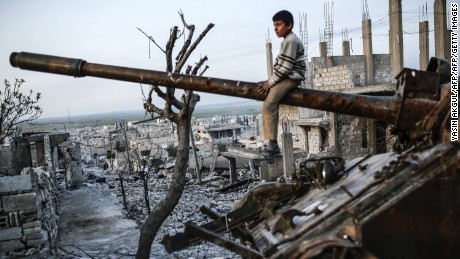
Play Video
Meet the key players in Syria's civil war
But a unilateral US withdrawal would leave the Kurds vulnerable to the regime, the Iranians and the Turks; ISIS remnants will sniff out opportunities in the chaos.
Other US officials, including Haley, have tried to temper talk of a withdrawal, but Assad may conclude that if he waits long enough, the US will lose interest. After all, Trump said on Friday: "No amount of American blood or treasure can produce lasting peace and security in the Middle East."
Why, then, make concessions? "Waiting out half-hearted enemies is a key Assad survival tool,"says Faysal Itani, a senior fellow at the Atlantic Council.
There are certainly no signs that the regime is ready to discuss anything that would challenge Assad's hold on power. And so the political opposition won't come to the table.
Turkey eyes opportunities
Turkey may be part of the "triad" with Iran and Russia but is very much going its own way in northern Syria, consolidating its influence into a chunky bargaining chip for the future. Its troops already occupy Afrin, a mixed Kurdish-Arab area and it is eyeing further incursions against the Kurdish militia -- the YPG -- that has worked with the US against ISIS. President Erdogan has said he will not rest until the YPG are driven from every part of the Syrian border.
Turkish forces, much to the Assad regime's fury, are also in Idlib -- ostensibly to guard a mythical de-confliction zone, but in reality to deter the regime from attacking the last rebel holdouts.
Iran at the gates
The Iranian "Quds" force has spent some four years entrenching itself in Syria. Try getting it to leave. The dream of The Iranian Revolutionary Guard Corps (of which the Quds is part) is a land bridge of Shia influence from Tehran to the shores of the Mediterranean, and within shooting range of Israel.
Responding to the weekend strikes the IRGC promised the United States that future events in the region "will not be to their interest."
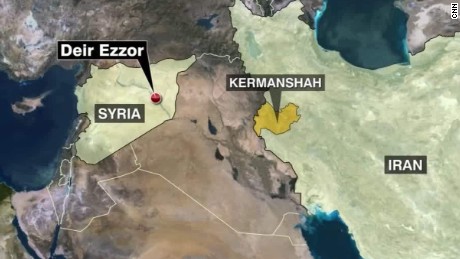
Play Video
Iran fires missiles into Syria
To Israel, the growing presence of the IRGC and Hezbollah in southern Syria is alarming. It has already carried out air-strikes against several Iran-linked targets in Syria, including the base near Homs which likely sent an armed drone into Israeli airspace in February. In response, the leader of the Lebanese Shia militia Hezbollah, closely aligned with Iran, warned that Israel had made a "historic mistake" which would bring the it "into direct combat with the Iranians."
Unless Russia can be persuaded to restrain the IRGC and even send some of its militia home, there is a real chance that Israel will get dragged much more deeply into the Syrian conflict.
The next slaughter
Then there is the Assad regime's determination to recover more of Syrian territory, specifically Idlib, the last hold-out of radical Islamist groups but also home to two million Syrians, more than half of them displaced from other parts of the country.
Ali Akbar Velayati, an advisor to Iran's Supreme Leader Ayatollah Ali Khamenei, said in Damascus last week that the liberation of Idlib is the next target of the "resistance front."
On Sunday, French Foreign Minister Jean-Yves le Drian said Idlib could become the next humanitarian disaster. "Idlib's fate must be settled by a political process," he told Le Journal du Dimanche.
Without a revived peace process, Syria's war will be refueled by all these competing (non-Syrian) interests. More than ever it will be a sandbox for a battle among outside powers.
Slithers of hope
What incentives are there to forestall the next episode of Syria's nightmare? Firstly, Russia doesn't want to be saddled propping up a broken state and hasn't the resources to embark on its reconstruction. Nor does it want to get caught up in a hot war between Israel and Iran.
Assad, at some point, will want to restore sovereignty over the 20% of Syrian territory controlled by the Kurds (with at the moment US support.)
In Moscow, Paris and Washington there is also recognition that a deterioration in Syria will provide ISIS and other jihadi groups with fresh opportunities, and maybe spark another refugee exodus.
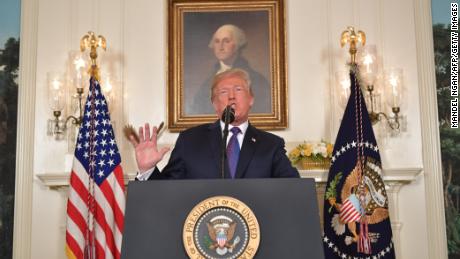
Play Video
Trump's message to Iran and Russia
But first there has to be a strategy to end the horror. Right now, the US doesn't seem to have one. Democrat Senator Tim Kaine said Sunday: "They haven't laid out a strategy, and military action shouldn't be taken as a one-off."
Whether Mike Pompeo as Secretary of State and John Bolton as National Security Adviser bring clarity to US policy remains to be seen. Their previous pronouncements suggest they will want a hard line against both Russia and Iran.
But all roads to Damascus go through Moscow. Can Vladimir Putin be persuaded to prod Assad towards meaningful negotiations and persuade the Iranians to cool it? Might he coax Turkey into leaving northern Syria, and under what conditions? And what might he want in return?
CNN's Saskya Vandoorne in Paris contributed to this report
News Courtesy: www.cnn.com

